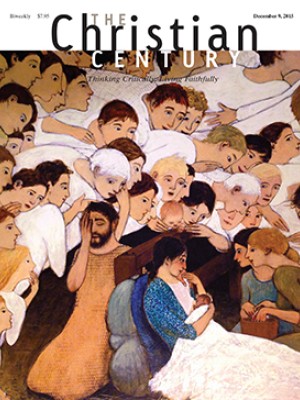December 24-25, Nativity of the Lord: Luke 2:1-14 (15-20)
There are many ways we receive the gift of Jesus badly.
My mind is on gifts. The ones I’ve purchased and squirreled away (I hope I can find them); the ones I’ve not yet purchased; the ones I hope someone will give me. I think of myself as a pretty good gift-giver, and I take a lot of pride in it. Possibly—probably—this pridefulness damages the gift giving a little, making me less great at it than I like to imagine. My motives are mixed: I am not giving just to give, but also because I like think of myself as a great gift-giver.
This time of year, the mind also turns to the gift that is Jesus. Is there any way to rescue the notion of Jesus-as-gift from the hideous Yuletide clichés about Jesus as the first Christmas present, Jesus as the best Christmas present ever, and so on?
Read our latest issue or browse back issues.
How might we describe the gift of Jesus? In the person of Jesus, the church has been given the gift of Jewish flesh—specifically, the gift of the Jewish flesh that extends intimacy with God to gentiles. The beginning of Luke 2 takes pains to show that Jesus is part of a particular family, a particular lineage—a Jewish family and lineage.
In the Christian account, when God comes to earth, God does not plunk down from the heavens in the form of a swan, or dress up as a crone and flit in to pay a visit to the object of God’s jealousy, or fall into a virgin’s lap in the form of a shower of gold coins. Rather, the Christian God comes to earth as the adopted son of an adoptive father who was “descended from the house and family of David.” And the Christian God is born of a woman—a particular woman who herself has a particular lineage. (This is the key to the puzzle of piecing together Judaism and Christianity: if no Mary, then no Romans 9–11.)
Jesus is gift. And just as it is possible to give a gift imperfectly, it’s also possible to receive one imperfectly. I receive gifts badly all the time. Given three Halloween goblets, I immediately decide to give them to my friend’s daughters rather than, as the giver intended, use them myself. Or I think about how cheap the giver is and wonder why he bothered to give me anything in the first place. Or I receive the gift and smile and say thank you, all the while contemplating how my own gift selection is superior. Or I am given a set of expensive, sharp knives and rather than use them to slice my dinner, I use them to slice my neighbor’s tires. All of these are ways of receiving a gift imperfectly.
The record of God giving us gifts and us receiving them imperfectly starts at the very beginning of the Bible. God gives being—existence—and Adam and Eve damage it. The prophets record, over and over, people’s capacity to misuse God’s gifts. Hosea describes people misusing agricultural gifts (corn, wine); Ezekiel describes misuse of the gift of the sabbath and the land. And on and on. Given this long record, it is perhaps not surprising that we receive the gift of Jesus imperfectly. Mary seems to receive him perfectly, and so do Luke’s shepherds and Matthew’s magi. But beyond that, the church’s reception of the gift that is Jesus is flawed.
There are probably many ways we receive the gift of Jesus badly. (I ignore the gift; I stick it a drawer and forget about it; I wish I’d been given a different gift instead.) Luke’s insistence on Jesus’ location in a Jewish lineage, however, points to one persistent way: we have received the gift while insisting that it entails God’s withdrawing the gift of covenant from the first people God gave it to.
That is, we have received the gift as supersessionists. We have insisted, as we hold out our hands for Jesus, that our reception of him entails God’s withdrawal of gift from the very people of Jesus, the people that make it possible for Jesus to be who he is, the people into whom Jesus stitches the church.
Thinking of Jesus as gift ought to help the church articulate precisely that God’s giving Jewish flesh to the church in the person of Jesus does not entail the abrogation of God’s covenant with Israel. After all, a distinguishing feature of many gifts is that once you have given them, you, the giver, still have them and can give them again. If I give a student knowledge I have about American history, I still retain the knowledge. I can give it again to a second student without having to take it back from the first.
In the covenant with Abraham, in the gift of Torah, God gives the gift of particular intimacy with God first to Israel. That is a gift God can give and still retain, a gift that God can give and then later give again to someone else without taking it back from God’s first recipient. In the manger, God gives the gift of particular intimacy to the whole world. And God gives that gift through “the house and family of David,” without withdrawing the gift from that house.






